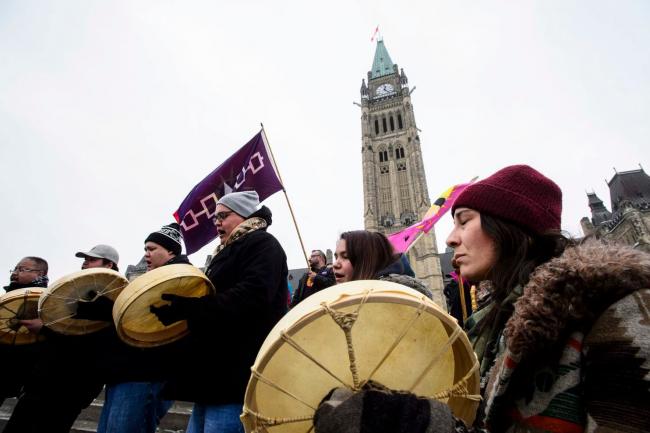Articles Menu

Jan. 9/2019
The pictures emerging from the scene of an anti-pipeline action in British Columbia could not be more off-brand for Justin Trudeau.
The Canadian prime minister came to power on a promise to rebuild the relationship between Canadian authorities and indigenous communities. Though he’s won plaudits for being willing to address these issues, critics often wonder how much his government has accomplished in the name of reconciliation.
In photographs and video circulated Monday and Tuesday, armed officers in tactical gear faced off with locals brandishing feathers as police advanced on a remote, snowy checkpoint set up to stop the construction of a natural gas pipeline that would run through the traditional territory of the Wet’suwet’en First Nation.
By the time darkness fell Monday, the Royal Canadian Mounted Police had arrested 14 people. On Tuesday, outrage over the arrests spurred small-scale protests in other Canadian cities, according to local media reports. There was also a pro-pipeline protest in Calgary, Alberta.
Tensions over pipelines and other major infrastructure projects have become a major challenge to the Trudeau government.
At issue are tough questions about how to balance Canada’s commitment to the environment and its energy sector, particularly given Trudeau’s pledge to do a better job of protecting the rights and wishes of the country’s indigenous peoples.
In August, a Canadian court overturned the approval of the Trans Mountain oil pipeline expansion on grounds that the federal government had failed to adequately consider aboriginal concerns about the project.
The pipeline now under dispute is part of $40 billion natural gas project being built by Coastal GasLink, a subsidiary of a Canadian company called TransCanada, that will move gas from the province’s northeast to the Pacific coast.
The conflict turns on land rights. In much of Canada, land rights are determined by treaties signed between the colonial government and indigenous tribes. But in British Columbia, there are few treaties, and many unresolved and overlapping claims.
On reserves, elected chiefs and councils have jurisdiction on land claims, but elsewhere, hereditary leaders claim authority over their communities’ traditional lands.
A number of indigenous bands along the proposed Coastal GasLink route signed on to the project, but a group from the Wet’suwet’en Nation opposes the plan, saying hereditary chiefs, not band councils, have authority.
Hereditary chiefs and their supporters set up checkpoints to block the company’s access to the area. In December, British Columbia’s Supreme Court issued an injunction that ordered the protesters to let workers through, leading to this week’s standoff.
Grand Chief Stewart Phillip, the longtime president of the Union of British Columbia Indian Chiefs, a group that advocates for indigenous rights, said the Wet’suwet’en case could shape how energy and land rights issues are talked about heading into federal elections scheduled for October.
“What happened and what is circulating on social media is setting the tone for 2019, which could prove to be battleground for issues with regard to native rights issues and resource development,” he said.
Pamela Palmater, chair in indigenous governance at Ryerson University, said the case points to the limits of rhetoric about reconciliation.
“There will be no reconciliation in Canada unless and until there is a real nation to nation relationship where Canada respects our sovereign jurisdiction and returns a fair portion of our lands and resources back to us,” she said.
Trudeau has yet to weigh in on the dispute. His office on Tuesday referred a request for comment to the office of Ralph Goodale, the minister for public safety.
“Our government is committed to a renewed relationship with Indigenous peoples based on the recognition of rights, respect, cooperation, and partnership,” a representative for the minister said in a statement.
“The [Royal Canadian Mounted Police] respects and protects the right to peaceful demonstrations as guaranteed under the Canadian Charter of Rights and Freedoms."
[Top photo: Protesters voice opposition to pipelines during a rally on Parliament Hill in Ottawa on Jan. 8. Dozens of rallies are planned in British Columbia, across Canada and as far away as Europe to support pipeline protesters arrested in northwestern British Columbia. (Sean Kilpatrick/Canadian Press/AP)]